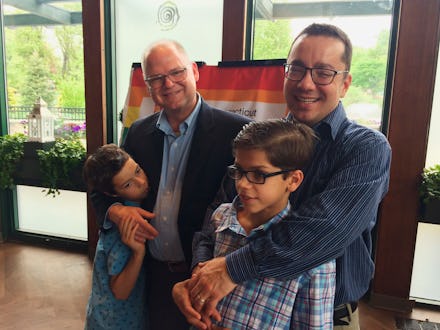Congress passes spending bill nixing amendment that discriminated against LGBTQ adoption

The House of Representatives passed a spending bill Wednesday that did not include an amendment allowing discrimination against potential adoptive and foster care parents.
The Aderholt amendment, as it was known, would have allowed taxpayer-funded child welfare agencies to legally turn away potential caregivers based on the agencies’ religious beliefs. Such policies are criticized for discriminating against LGBTQ, single and non-Christian parents.
Though the amendment was initially passed by the House Appropriations Committee by a 29-23 vote, it was ultimately defeated for the final spending bill appropriating funds for the Department of Health and Human Services. Forty senators signed a letter opposing the amendment, writing that the provision would have “elevate[d] the religious beliefs of taxpayer-funded foster care providers over the best interests of children.”
“I was proud to fight to ensure that the Aderholt amendment — which would have inserted bigotry and discrimination into our foster care and adoption systems — was removed from this year’s Labor, Health and Human Services, and Education funding bill,” Rep. Rosa DeLauro (D–Conn.), a ranking member on the Labor, Health and Human Services and Education Appropriations Subcommittee, said in a statement. “Children deserve to live in safe, happy, and healthy permanent homes, and their best interests should always be placed first. No qualified adoptive and foster care parent should be discriminated against, period.”
The amendment was also opposed by 250 civil rights, religious, child welfare and other organizations, including the Family Equality Council, Human Rights Campaign, Alliance of Baptists, NAACP and Log Cabin Republicans.
“The successful defeat of the Aderholt amendment sends a clear message: There is no place for taxpayer-funded discrimination in the child welfare system,” the American Civil Liberties Union said in a statement.
While the amendment’s failure puts a hold on child welfare discrimination in the federal government, the issue is still playing out at the state and local level. At least nine states have laws sanctioning the discrimination, including recent laws in Kansas and Oklahoma that passed in May.
A federal court ruled earlier in September that a lawsuit challenging Michigan’s “license to discriminate” law can proceed, however, and a separate federal court ruled in July that Christian agencies in Philadelphia must abide by the city’s nondiscrimination policies. The Philadelphia ruling was appealed but ultimately rejected by the Supreme Court.